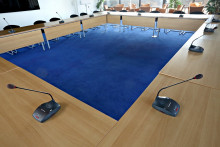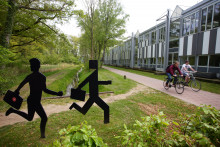Due to the steady influx of new students, the bachelor's programmes in Technical Computer Science and Psychology as well as the master's programme in Positive Clinical Psychology & Technology want to implement a numerus fixus starting in the academic year 2022-2023. In his speech, Kevin Witlox (UReka) sketched the situation. 'In 2016, when I started my Computer Science studies, there were 120 students. For the coming academic year, there will be 400. As University Council, we therefore see the need for a numerus fixus.'
However, Witlox expressed his concerns about the imbalance between Dutch and international students. According to him, a numerus fixus could increase this imbalance even further. 'Dutch students are less competitive when it comes to high grades at their high school. A numerus fixus could put them at a disadvantage compared to competitive international students. Whilst the UT's primary task is to educate students for the Dutch and regional economy.'
Dick Meijer ((PvdUT) also contributed to the discussion. 'The UT is ignoring its primary task: namely to educate Dutch students. Only a third of the students in Computer Science are Dutch. Moreover, a large proportion of the international students leave Twente after their bachelor's degree to do a master's programme elsewhere. That is not beneficial to the regional economy.'
Dutch programme
Meijer therefore called for a parallel Dutch Computer Science programme. 'In my view, that would be easy to realise. After all, that's how we did it for more than thirty years. The copies of the Dutch readers from five years ago are still on the shelf, and we can hand them out easily.' Surprisingly, rector Tom Veldkamp did not immediately reject this suggestion. 'In principle I am not against a Dutch-language study programme. But first I want to see how the numerus fixus will work out.'
Petra de Weerd-Nederhof (Campus Coalition) also pointed to the shortage of suitable ICT staff in the region. 'That's another reason why a Dutch Computer Science programme would be worth considering, in cooperation with Saxion, for example.' The rector recognised the problem. 'But this is also due to demographic developments: there are simply fewer potential students in the region. It would be good to make companies more aware of the potential of our non-Dutch alumni.'
The rector agreed with most of the University Council's points of action, such as raising the English language requirements and fixing the imbalance between Dutch and international students. 'We are already working on new English language requirements, so that we can select more suitable students. We are also looking at the imbalance. Other universities are struggling with the same problem in their Computer Science programmes. We are trying to make a national policy for this.'
Reserved spots
In conclusion, Meijer mentioned another problem: the recruitment of international students abroad for Computer Science - in particular by Navitas, a private company offering transition programmes at the UT. 'It is hard to explain that students from Navitas can register for Computer Science without any problems, while Dutch students may not get a place due to the numerus fixus.'
According to rector Veldkamp, for studies with a numerus fixus, no promotional activities are taking place abroad, also not by Navitas. 'However, agreements have been made with Navitas regarding students who will be studying Computer Science at the UT after the foundation year. After all, they have already been accepted for the programme. We are bound by this. But this only applies to the next transitional year, after that it will end.'
In the end, almost the entire University Council agreed with the plans for a numerus fixus for Computer Science. Only Meijer gave a negative advice about what he considered a 'policy free' measure. The numerus fixus for Psychology was unanimously accepted without further discussion.






